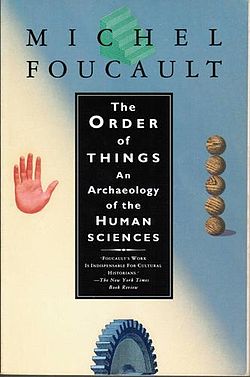- The Order of Things
-
The Order of Things Author(s) Michel Foucault Original title Les Mots et les choses Country France Language French Subject(s) Philosophy Publisher Éditions Gallimard Publication date 1966 Published in
English1970 Media type Paperback Pages 404 ISBN 2070224848 OCLC Number 256703056 The Order of Things (original title: Les Mots et les choses, French for Words and Things) is a book by Michel Foucault first published in 1966. The full title is Les Mots et les choses: Une archéologie des sciences humaines. It was translated into English and published by Pantheon Books in 1970 as The Order of Things: An Archaeology of the Human Sciences (Foucault had preferred L'Ordre des Choses for the original French title, but changed the title because it had been used by two structuralist works published immediately prior to Foucault's).
Foucault endeavours to excavate the origins of the human sciences, particularly but not exclusively psychology and sociology. The book opens with an extended discussion of Diego Velázquez's painting Las Meninas and its complex arrangement of sightlines, hiddenness, and appearance. Then it develops its central claim: that all periods of history have possessed certain underlying conditions of truth that constituted what was acceptable as, for example, scientific discourse. Foucault argues that these conditions of discourse have changed over time, from one period's episteme to another. Jean Piaget, in Structuralism,[1] compared Foucault's episteme to Thomas Kuhn's notion of a paradigm. Foucault demonstrates the parallelisms in the development of three fields: linguistics, biology, and economics.
Foucault's critique in Les mots et les choses has been influential in the field of cultural history.[2] The various shifts in consciousness that he points out in the first chapters of the book have led several scholars, such as Theodore Porter,[3] to scrutinize the bases for knowledge in our present day as well as to critique the projection of modern categories of knowledge onto subjects that remain intrinsically unintelligible, in spite of historical knowledge.
The Order of Things brought Foucault to prominence as an intellectual figure in France. A review by Jean-Paul Sartre attacked Foucault as "the last barricade of the bourgeoisie". Foucault responded, "Poor bourgeoisie; If they needed me as a 'barricade', then they had already lost power!"[4]
See also
Notes
- ^ Piaget, Jean (1970). Structuralism. New York: Harper & Row. p. 132.
- ^ Chambon, Adrienne (1999). Reading Foucault for Social Work. New York: Columbia University Press. pp. 36–37. ISBN 023110717X.
- ^ Porter, Theodore (1992). Quantification and the accounting ideal in science. Social Studies of Science 22: pp. 633–651.
- ^ Miller, James (1994). The Passion of Michel Foucault. New York: Anchor Books. p.159.
External links
Categories:- 1966 books
- Philosophy books
- Books about discourse analysis
- Works by Michel Foucault
Wikimedia Foundation. 2010.

